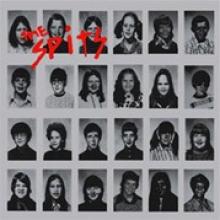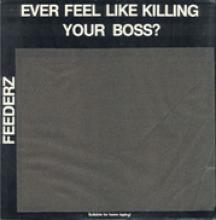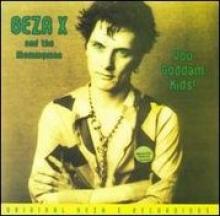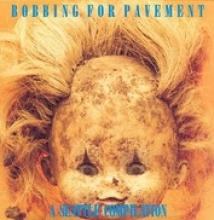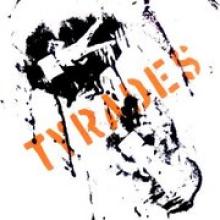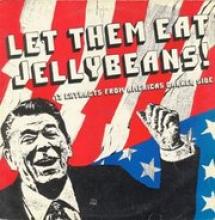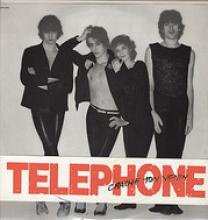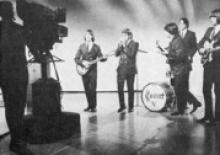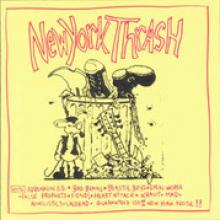A (too) Short Spits Disc...
That, though, doesn’t mean that the slab is less than previous efforts, just that folks are getting too picky.
Surely, the first three long players from the Seattle group – and its innumerable slew of singles – comprised tracks that will soon be considered modern classics. So everyone expected to get more of the same on this newest release. And really, that’s what there is. It’s hard to depart from a formula that was codified thirty years ago and updated in the early aughties. There’s no deviation here from previous efforts, but from the first time that I had the pleasure of taking a listen to Vol. IV a bit of grumbling from others has followed.
That being said, if folks find it so difficult to appreciate what’s here, toss on an oldie, but goodie…
The moment that folks perceive some difference in a band that they’ve grown to love, there’s bound to be some small clutch of defectors. That’s all well and good, but the Spits don’t seem to be approaching music any differently here. The one (almost) hiccup in the album could be the ratcheting up of melodicism in the group’s vocals.
And while the Spits always trucked in pop based, fuzzy punk, the chorus from “Life of Crime” could present itself as a problem to some brow furrowing collector. It’s sugary sweet and all, but layered atop one of the most distorted and bassy backing tracks that the group’s come up with thus far. Despite the ridiculous lyrics that accompany the track – which I believe can be understood in a number of ways, but might include the word troglodyte at some juncture – it’s just stripped down, cough syrupy punk. No more, no less.
The reason, in part, that the Spits have been able to amass the following that it has over time is because of its adherence to a simple aesthetic – one that doesn’t really mesh too well with any sort of modernization. So the complaints that the disc have met with could be attributed to the ridiculously short run time of just over fifteen minutes.
With each song landing somewhere between a minute and change and two and a half minutes, though, it works out. The Spits have never had anything too deep to say – and they shouldn’t.
Who would listen? Probably no one.
So while the group’s discs are going to continue to move briskly, shucking this album for the price of a full length might be perceived as lame. But seeing as the difference in run time between this offering and the group’s previous efforts is just a matter of a few minutes, listeners should probably just clam up and be glad that there’s more stuff pouring out of these costumed Seattlites.
The Feederz and the Downfall of Western Civilization
Looking at rock writing from the early ‘90s journalists would have you believe that after 1980 or so, punk disappeared only to resurface with Nirvana and its cohort. And while there’s some argument to be made regarding the Seattle group’s importance in underground music’s culture, Cobain and company wouldn’t have existed if there wasn’t a constant slew of low run records and weirdo bands traversing the States.
That being said, one of the bands that hasn’t necessarily aged too well in the eyes of those that work behind the scenes in those aforementioned music rags is an Arizona come San Fran group headed by Frank Discussion called the Feederz.
During its earliest incarnation in the late ‘70s, Discussion surrounded himself with local folks from his hometown. But by the beginning of the ‘80s the singer and songwriter had made his way to NorCal as Discussion’s music already bore a striking resemblance to what Jello Biafra and the Dead Kennedys were up to. The fact that Biafra ran Alternative Tentacles, an independent record label, and had released the Let Them Eat Jellybeans! compilation, which included a Feederz track, didn’t hurt matters much.
When Discussion arrived, he quickly moved to form a new core Feederz line-up and appropriate various Kennedys at different times. But on the Feederz first long player he was accompanied by D.H. Peligro, Biafra’s drummer. Entitled Ever Feel Like Killing Your Boss?, which included a piece of grip tape (kinda like sandpaper) on the cover in order to damage any adjacent albums, the disc was made up of various screeds against normalcy and some songs to just confound the normals – “Dead Bodies” being one of them.
It became clear from just that one long player that the Feederz were capable of more than just a few catchy punk and hardcore tracks. The album opener, “Have You Never Been Mellow,” even finds Discussion singing as opposed to screaming out all those antisocial lyrics.
It was also immediately apparent that the group, even as it occasionally approximated the Kennedys’ sound, was more musically adept than most of its cohort. By the group’s second disc, released in 1986 and called Teachers in Space, the band took on an occasionally post-punk angle to its hardcore and straight punk stuffs. The ensemble went so far as to quote “My Favorite Things” in the middle of its track “New Crime.”
There’s no proper reason as to why there would only be one more Feederz album. And while Discussion continues to record occasionally, his group’s first few discs need to rightfully be considered achievements of mid ‘80s punk even if the band began during the previous decade.
Geza X: Skewed '80s Punk and Pop
But before commanding enough respect to circle around him such a vast group of talented players, Geza X worked sound for the infamous Los Angeles venue the Masque. Located in the basement of some shambolic building, the Masque functioned as crash pad, practice spot and concert hall for the nascent punk scene. Certainly, there were punk houses cropping up all across town and down into Orange County, but the Masque was home to some of the bigger names of the scene.
Concurrently to making a name for himself at the venue he recorded the Dead Kennedys as well as the Germs before Darby Crash had his run in with death in that fateful garage. Geza X was able to distill the more jagged and less fashion conscious scene in California (well, that’s relative – how much time do you think kids spent painting leather jackets and affixing studs to articles of clothing?). Separate from his work behind the boards Geza X went in on a record that attempted to include some skewed humor and even a bit of new wave flavor atop of its punk theatrics.
Before working out what this all amounts to, it’s worth noting that Geza X didn’t move around in straight punk tropes. And while there were undoubtedly a vast number of folks trucking in the same sounds, the Flesh Eaters were probably closest to what Geza X got on tape with his own group. But coming out of Akron was an ensemble called Tin Huey that, a few years earlier, were able to extract punkiness and toss in a goofy RnB thing. It’s just as possible that Geza X was aware of the Akron band as not. Regardless, though, the similarities are worth noting.
As for You Goddam Kids!, which was released in 1982 through some label called Final Gear, the album was made up of a few tracks that were represented elsewhere – most notably “Isotope Soap” appeared on Jello Biafra’s Let Them Eat Jellybeans. And while that track should be considered the highlight of the disc, comedic fair like “Funky Monsters” and “Practicing Mice” are just as listenable.
“I Hate Punks” arrives as the most radio friendly track – musically at least. With that easy melody bolstered by a saxophone, Geza X gets off one of the more melodically accessible choruses on the disc. Unfortunately or not, the subject matter discussed here just wouldn’t have translated to a broad audience.
Despite You Goddam Kids! being his lone long player, Geza X has remained a vital part of the music industry down there in SoCal by continuing to record groups in the studio he owns. Cop it well…
Classic Compilations: Bobbing for Pavement
The ‘label,’ if it can actually be called that, was based around members of the Gits who were in residence at punk house. Of course, the most immediate story surrounding all of this is that of Mia Zapata, her music and her ultimate demise. But before she was taken from her friends, family and band mates, Zapata was able to contribute a few tracks to the Bobbing for Pavement compilation.
Apart from the fact that the title of the disc is just short of hilarious, the album remains an important cultural land-marker for whatever was happening in the Northwest during the early ‘90s. It could be assumed that there was one centrally located scene that every band was a part of. That, though, seems to be an untruth.
Instead, the Rathouse bands were apparently detached from the larger (soon to be dubbed) grunge thing that focused on Sub Pop affiliated groups. But regardless of that, the folks that contributed to Bobbing for Pavement were as capable as the bands down the road that would soon garner million dollar contracts and the like. Unfortunately, no one from the Rathouse sphere would go on to make any sort of impact on a national scale. That being said, the Gits were poised for a major label deal and a national tour. It just didn’t happen.
So while all of that (sad) history is important in understanding this document, Gas Huffer, who would continue to record throughout the decades following the release of the 1991 compilation, begin things in a sort of retro-rock mode with a keen eye towards punk. The two efforts that the band gives up constitute some of the stronger moments on the compilation, but aren’t really all that memorable in a grand sense.
Again, returning to the Gits and Zapata, which turn in tracks three and four – the group’s “Here’s to Your Fuck” is really the most entertaining track on the entirety of Bobbing for Pavement. There’s a Black Flag flair to the guitar, even if those momentary bridges come off a bit too metally for anyone’s taste. The track is as close to hardcore as anything from the above ground Seattle scene – or subterra either – without being out and out thrash.
The ensemble’s other offering – “Ain’t Got No Right” – and it’s willfully bad grammar, isn’t the greatest thing the band released, but wouldn’t wind up being represented on either of the Gits’ full lengths.
Given over to friend’s bands, the remainder of the disc less than urgent as D.C. Beggars even approximate the Gits in muted tones. Big Brown House is silly in retrospect, but the dirty punk of the Derelicts makes up for a bit of the perceived shortcomings over the remainder of the disc. Regardless, though, Bobbing for Pavement is an indispensible historical document. Cop it and learn something.
The Tyrades Let You Down...
The Tyrades are one of these acts.
Initially based out of Buffalo, New Yawk, the band eventually moved to the big city of Chicago subsequent to becoming the adored weirdoes of mags like Maximum Rock ‘n Roll. But regardless of the move and what made it all occur, the quartet - Jenna Tyrade (vocals), Jimmy Ordinary (guitar), Robert Miscellaneous (bass) and Frankie Jensen (drums) – were able to distill some angsty, jittery and coffee inspired, slurred punk.
The band’s music has been referred to in terms of garage as well as having its antecedents located over there in San Francisco during the ‘70s. And while none of that is grossly inaccurate, there’s as much of a perverted no wave thing going on here as anything else. That’s not to say that the Tyrdes truck in completely unintelligible rock stuffs that works with art as its theoretical backdrop, but in some of the band’s music an artsy (yet authentic) guitar work ties the band to a forgotten New Yawk, New Yawk scene.
Of course, it’s hard to figure a group for clutch of disciples from just a single full length – although over a few short years, the Tyrades would record at least five singles. Despite the relatively short life span of the group and what it left behind, the 2003 Broken Rekids released album went a long way to solidify the legacy that these folks created for themselves.
Although the band’s lone long player clocks in at just over twenty minutes, the amount of out of control moments spread over its nine tracks is pretty shocking to take in. Seemingly the day of screaming women singers was passed, but Jenna Tyrade’s performance here is something surpassing inspired.
Tracks with titles as bizarre as “Cut Your Feet Off” arrive with sputtering melodies and rock steady drumming to support the antics that Jenna Tyrade reels off. There’s even a bit of almost scatting here that’s most likely meant to approximate Ramonesy choruses and ohhs and ahhs, but gets rendered in the most ugly (that’s good here) terms.
There’s nothing pop inflected or flowery about anything on this disc. And although it was released via Broken Rekkids, the Tyrades could have easily earned a place next to the Piranhas on In the Red if they’d not given up the ghost.
It’s a noisome punk from “Same Sex Killers” to the album closer, “I Hate Your Wave” with its derisive comment on folks who pick up on fads. And while the scene commentary might not necessarily jive with whatever else is on Tyrades it all comes off white hot and dished up with the right amount of sneering distortion making the disc is a winner.
There might be a lack of lady front-men (if the makes sense), but the Tyrades had one of the better ones in recent memory.
Classic Compilations: Let Them Eat Jellybeans!
Biafra’s earliest attempt to distill what was going on over there in Cali and even up into Canada was represented in the pressing of Let Them Eat Jellybeans! The cartoon face of then president Ronald Reagan greeting listeners each time the slab was tossed on was a successful joke even if the image probably won’t play to today’s current crop of young punkers.
That being said, some of the music – political or not – has aged in much the same way as that cover image. It’s not that there isn’t good music here, but the inclusion of some bigger name bands, that are now pretty easily found in major record stores, renders some of Let Them Eat Jellybeans! an artifact of a bygone era. Alongside the Republican jokes are the likes of Black Flag, the Circle Jerks, DOA, Bad Brains and of course the Dead Kennedys’ contributing some of its classic cuts making some of the album less than a necessity at this point.
With the majority of the first side of the compilation taken up by those bigger names, the Feederz present themselves as the most interesting inclusion on side ‘A.’ With that in mind, it’s worth noting that the band comes off as something like a cut rate Dead Kennedys’ with the lead singer of the Feederz, Frank Discussion, sounding exactly like Biafra when yelling about asses and the like during “Jesus Entering from the Rear.” Musically, the song’s a winner, just funny when contrasted with the Kennedys’ output.
As the second side begins Geza X gets his just due seeing as the man was responsible for producing records by some of the bigger names in west coast punk at the time. He’d never parlay that renown into a highly visible recording career, but “Isotope Soap” is an off kilter, punk killer. The descending – and nonsensical – guitar line separates this work pretty easily from anything on side ‘A’ of the record. But the inclusion of Geza X points to the breadth of punk related stuff that was getting worked out in California during the time period.
Continuing on in the same vein as Geza X, the second side of Let Them Eat Jellybeans! includes a group called B People and its offering “Persecution (That’s My Song).” While a lot of what’s included on this compilation gets bogged down by political or social messages, B People are able to get past it all by turning in an odd, almost gothic and stately take on punk replete with occasional saxophone.
Jellybeans won’t change your life now, but back in 1981 it probably would have. Unfortunately, the disc isn’t slated for re-issue due to legal wrangling, but keep scouring those innernuts to hunt it down.
Telephone: Crache Ton Venin (Whatever that Means)
Belgium might be the most consistent in cranking out groups – the Kids remaining one of the greatest punk bands of all time. But that band was partial to the King’s English. Anyway, holding a listener’s interest arrives two fold. Firstly, a band needs some sort of melodic hook – in punk at least. It might be all too simple and dumbed down for the general public, but it’s gotta be there. Secondly, though, it’s always a bonus when one can sing along. And for the most part, bands stick to its native land’s tongue while performing. The Ex are a notable exception. But that band’s made up of weirdo anarchists and as likely to play funk as sound like a Subhumans’ styled group.
Regardless of that, the best groups – or Plastic Bertrand even – are able to capture the imaginations of listeners with sultry nonsense and a bit of perversion in any language. The first part is applicable to France’s Telephone.
The group was active during the latter portion of the seventies and worked a few years into the eighties releasing albums with increasingly troublesome artwork. So while the band began as some mélange of punk, new wave nerviness and classic rock, to gander at those covers from the eighties it would be easy to guess that the group devolved into something less than great.
Only being able to track down the ensemble’s second long player - Crache Ton Venin, which was released in 1979 – grants listeners a look into a band’s career part way figured. It was surprising enough to locate this slab, so hunting down its predecessor seems like something beyond the realm of possibility. All involved should keep their eyes open…
Anyway, Telephone’s second disc, comprised of ten French language tracks, finds Jean-Louis Aubert (singer and guitar), Louis Bertignac (singer and guitar), Corine Marienneau (baser and singer) and Richard Kolinka (drums) working through its vast influences.
As already mentioned, these folks fence sit most of the time, with even its most aggressive tracks including a bit of schmaltz for the radio audiences interested in punk during the late ‘70s. “J'sais pas quoi faire" gets as nasty as any other power pop track of the era, but there’s a bit of cowbell inserted there for some G-d unknown reason. And while this offering, specifically, shows off the band’s chops, there might be too much sweetness here for the spikey haired crowd.
It’d be easy to guess that the band had a decent run as it opened for the Rolling Stones not just in France, but in the States and Japan. The onset of the eighties, though promising for the likes of Blondie, the Clash and the Talking Heads who were able to turn rebellion into profit, even as it led to the dissolution of not just Telephone, but all of those one time upstarts.
The Bay's Garage: A Primer
While the majority of Grateful Dead fans listen almost exclusively to live recordings, the ensemble’s earliest long player included a gentleman on vocals and harmonica simply known as Pigpen. His presence in the group, prior to his death in 1973, can be considered negligible considering the scope that the ensemble would eventually take on. The spate of blues covers and distorted rock tracks that the Pigpen and the Grateful Dead turned in on the 1967 eponymous disc, though, should rightly be perceived as an important moment in defining garage rock and where it came from.
The Warner Brothers released disc, which contained a few recognizable references to earlier blues-men also sported a track entitled “Cream Puff War,” which should be used to stultify silly hippies who are under the impression that he or she has a complete grasp on their favorite band’s litany of songs. Rarely included in the band’s performances after the ‘60s, the song remains a unique effort from an ensemble that would eventually be renowned for its extended improvisations. The succinct run time of just over three minutes found the Grateful Dead working out a pop construction with distortion doused all over “Cream Puff War’s” chords and solos. Lyrically, the track disguises its political agenda with a scant narrative focusing on an interpersonal relationship.
And while the Grateful Dead’s first album didn’t work to cement its legacy and eschewed much of the time period’s overt drug references. But there were other bands that didn’t demure lyrically or aurally from shocking audiences.
A part of that mid-decade clan of geared up rock and blues enthusiasts were San Jose’s Count Five. Released in 1966, its “Psychotic Reaction” is perceived to be one of the earliest and most blatant references to LSD in rock music. Obviously alluding to drug use, the title doesn’t portend the entirety of the track, which is actually couched in the discussion of an interpersonal relationship.
Parading through Bay Area rock clubs and performing on television, “Psychotic Reaction” took the Count Five on a brief excursion through stardom. The song, which begins with the strangled tones of John Michalski’s electric guitar and Kenn Ellner’s harmonica moves through a staid song structure. As the track reaches its chorus, there’s a drum roll that moves “Psychotic Reaction” into a fast paced section that foreshadows the following decade’s punk predilection. The Count Five’s hit, though, was brief moment in recorded history: a scant three minutes and change.
As important as the song would become in the ensuing years, the fact that the band donned capes while performing live can be seen as the through-line from the ‘60s garage scene to today.
Classic Compilations: NY Thrash
There’ve been countless tape come compact discs released through other labels that documented a sound, but New York Thrash has some of the biggest names and one of the more consistent track listings. Yeah, the Beastie Boys are on here and yes, they were a hardcore band (a pretty good one too). The Bad Brains crop up a few times as well, contributing two songs. But everyone already knows about those bands, or they should at least.
What’s most interesting here, and important from an historical point of view, are the second tier groups. Kraut’s probably one of the best known acts represented over the course of the disc, but really, the group would be considered average if it’d shown up just a year or two later.
Bobby Steele’s the Undead make an appearance subsequent to the guitarist’s split with the Misfits. And regardless of what one thinks of Glenn Danzig’s outfit, the Undead come off all poppy and digestible. The guitar’s still just dirt and grit, but Steele cops an Brit accent and goes in on an almost happy sounding melodic progression.
Just prior to Steele’s appearance, Nihilistics explain why the hardcore genre is occasionally met with snickers and dismissal. Granted, seeing as the tape was released almost thirty years ago, all involved need to be cut a bit of slack, but with “Here and Now” sporting lines like, “I believe in anarchy/So, burn the city down,” it’s difficult to take much of this seriously.
Again, though, some of the higher profile underground bands (if that makes any sense at all) render New York Thrash something of a pleasure to sift through.
Adrenalin O.D. turns in “Paul’s Not Home.” Lacking that musical acumen, the entertainment value of the song still can’t be understated. Beginning with a bit of a skit as some unwitting fool asks if Paul’s home, the song launches into what should be the answering machine message for anyone with the Apostle’s name. Lasting almost two minutes, the song runs out of steam less than half way through. But that readily explains why so many hardcore songs – in addition to the pacing – end so quickly.
Admittedly, there’s better hardcore out there – some tougher stuff too seeing as a lot of this just comes off as punk (Heart Attack’s track disputes that very statement). The variety on New York Thrash, though, points to a time when music was just what came out and not a genre. Boss…
